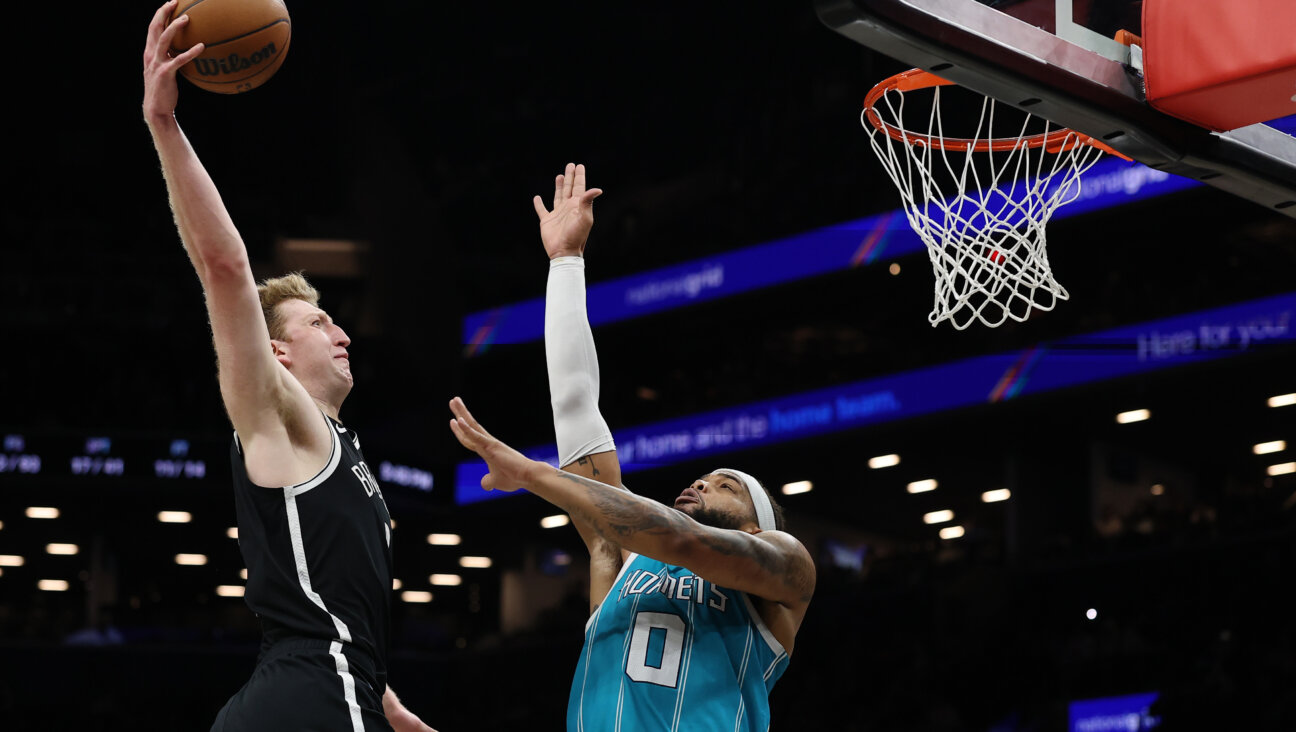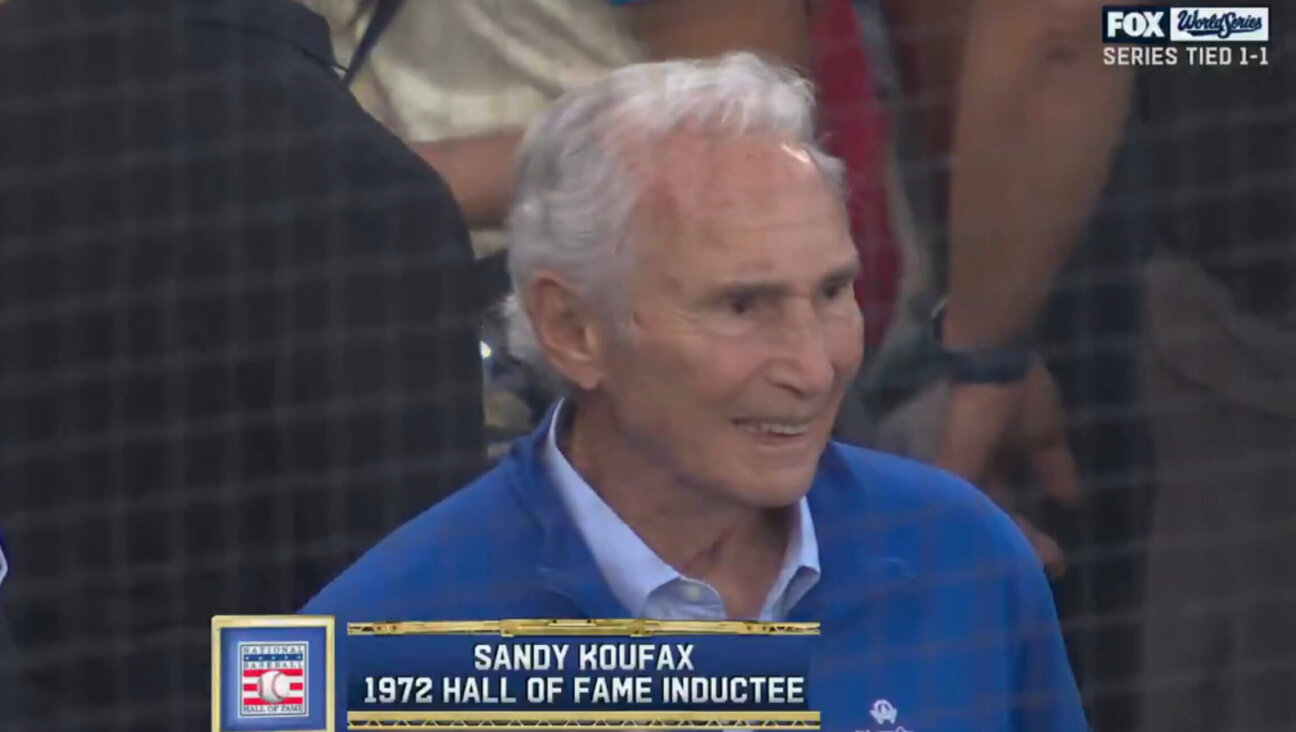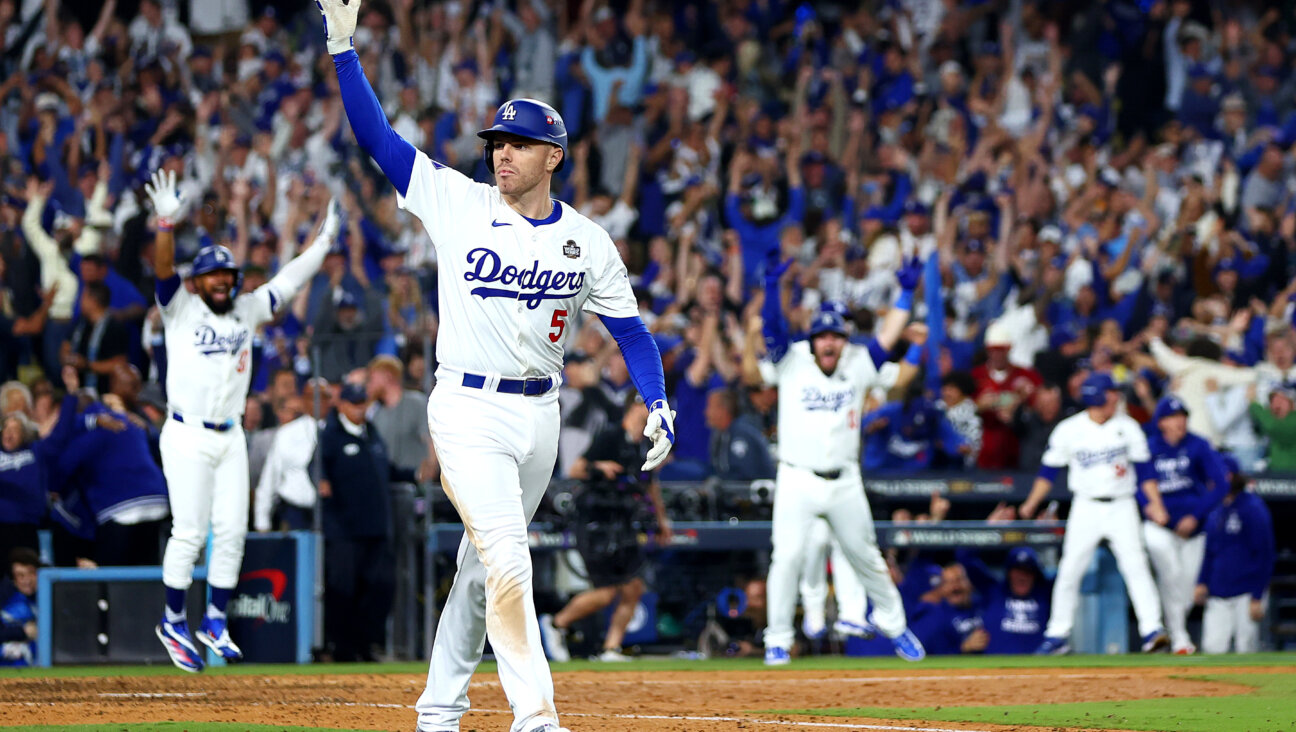The Jewish world has largely forgiven Meyers Leonard. Why can’t everyone else?
It’s been almost two years since Leonard used a slur on a livestream. But it doesn’t seem like that’s the grudge
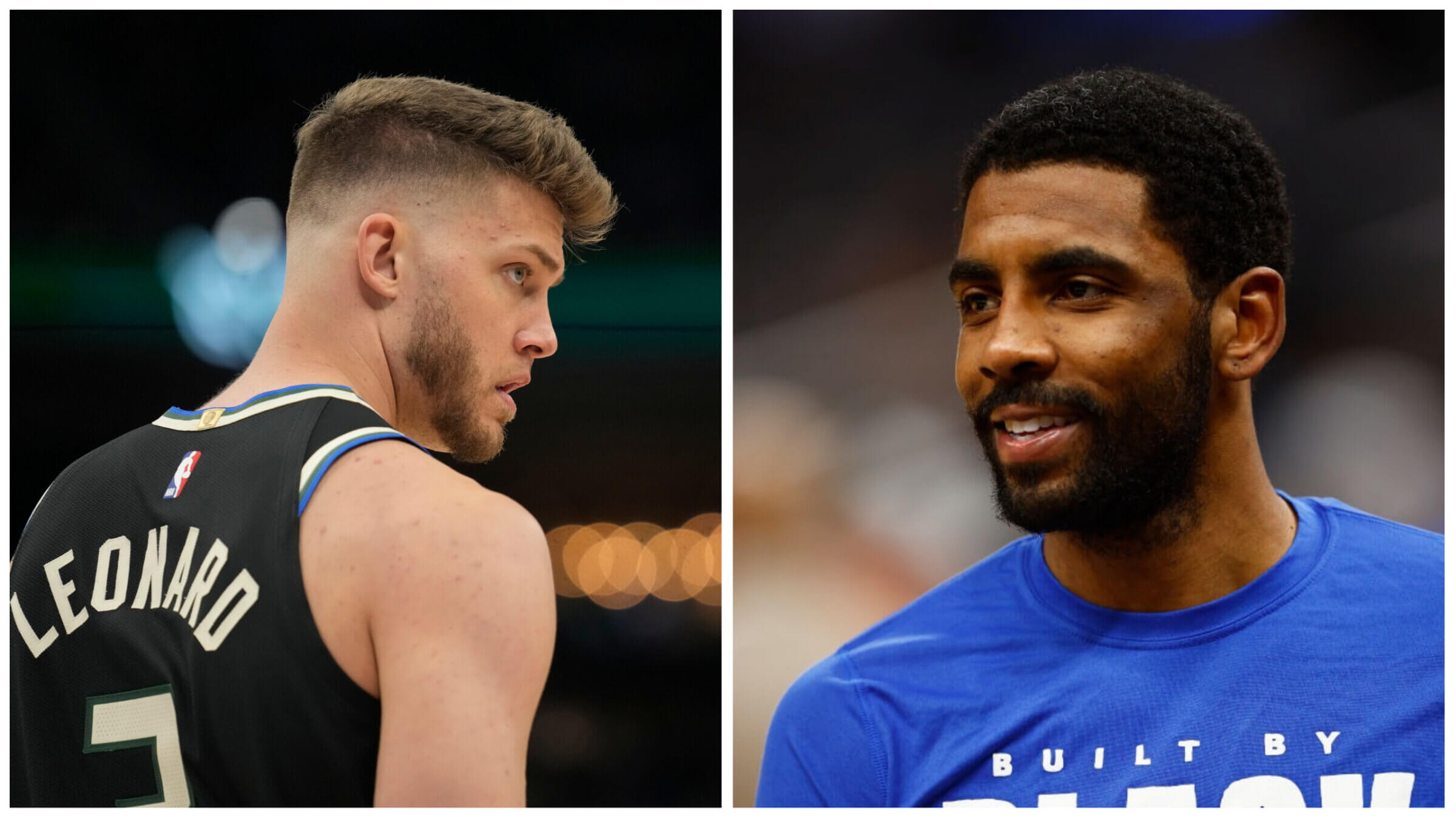
Nearly two years after an antisemitism scandal, Meyers Leonard, left, is still plagued by accusations of racism. In October, Kyrie Irving shared an antisemitic movie on Twitter. Photo by Patrick McDermott/Getty Images; Ronald Martinez/Getty Images
When Meyers Leonard landed a 10-day contract with the Milwaukee Bucks last week, marking his return to the NBA after two years in apparent exile, many in the Jewish community hailed the news. The journeyman center had not played since blurting an antisemitic slur on a livestream in 2021, but Leonard’s remorse appeared sincere, as did his efforts to make amends.
“@MeyersLeonard’s story is a model of true repentance and growth,” Jewish podcast host Ari Lamm tweeted to nearly 20,000 followers in response to the signing. “And what followed from the Jewish community was forgiveness and embrace.”
“Meyers can come to my seder,” wrote another.
But comments like these were drowned out by the majority of the NBA’s fan commentariat online, which greeted the news with scorn. “Once again, cancel culture isn’t even real,” wrote one NBA podcaster to her nearly 60,000 followers. “Yikes,” others chimed in. And when the NBA asked its followers Monday to join it in wishing Leonard a happy 31st birthday, hundreds of replies answered, simply, “no.”
The apparent division over Leonard’s career revival can probably be attributed to how closely some fans — from the Jewish community in particular — have followed his narrative. And mileage will vary on a millionaire’s teary apology, especially when it comes when the person’s career is threatened. But the reluctance to forgive Leonard may also reveal some fans’ lingering resentment over a different moment involving the journeyman center — and with how a more recent antisemitic incident in the NBA played out.
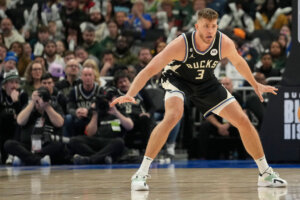
‘The biggest mistake of my life’
A 10-year NBA veteran, Leonard was sidelined with a shoulder injury about two years ago when he made what he now calls the biggest mistake of his life.
On March 8, 2021, while playing the video game Call of Duty on a livestream, Leonard reacted to a shootout in the game by snarling at an unseen opponent, “Don’t f—ing snipe me, you k— b—h.”
A recording of the moment was posted online the next day drew immediate condemnation from Leonard’s team at the time, the Miami Heat, as well as the NBA, which fined and suspended him, and from Jewish community groups like the ADL. It also started a conversation about the origin and meaning of the offending “k-word.”
Leonard said he was “deeply sorry” in an apology he posted to Instagram March 9.
“While I didn’t know what the word meant at the time, my ignorance about its history and how offensive it is to the Jewish community is absolutely not an excuse and I was wrong,” Leonard wrote. He added: “I am committed to properly seeking out people who can educate me about this type of hate and how we can fight it.”
In the next few days, Leonard connected with Rabbi Pinny Andrusier, director of Chabad of South Broward, and since then has volunteered at several Chabad events, including a basketball camp, a meal for Holocaust survivors and a panel on antisemitism.
His attempt to make up for his actions won over many, including the ADL, which wished Leonard luck with his new team in a statement.
“In the time since Meyers Leonard made an extremely disturbing antisemitic remark on a video game livestream, he has taken numerous steps to learn from his mistake, educate himself on the dangers of antisemitism, and make amends with the Jewish community,” wrote ADL spokesperson Jake Hyman. “We understand that some folks may not be able to forgive Leonard for his hurtful comment but at ADL we believe in counsel culture, not cancel culture.”
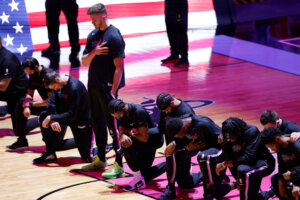
Refusal to kneel
It’s unlikely Leonard’s redemption arc has received as much attention as his initial outburst. But uttering the slur is not the only action some NBA fans hold against him.
Following the murder of George Floyd at the hands of Minneapolis police in 2020, NBA players decided as a group to convey their frustration with the state of racial justice in America by kneeling during the national anthem. Leonard, who is white, was one of the only NBA players who remained standing.
His brother, Bailey Leonard, served two tours in Afghanistan with the Marines, and Leonard attributed his decision to his respect for the military.
While he said at the time that he supported Black Lives Matter and that he didn’t think kneeling was disrespectful, and wore the BLM T-shirt — and while his coach and teammates said they supported him — Leonard’s decision to stand met widespread contempt among NBA fans.
To those fans, his use of an antisemitic slur less than a year later fit a pattern.
And whatever effort he made to backtrack from the anti-Jewish slur, many still haven’t forgiven him for his perceived abandonment of the Black community in that moment.
“Let’s not forget he’s the lone player to stand during the anthem and Black Lives Matter movement… coincidence… I think not…” one Twitter user wrote in a comment that was liked over 1,000 times.
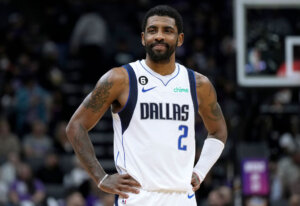
A perceived double-standard
Leonard’s return to the court occurs as another NBA player, Kyrie Irving, continues to be dogged by accusations of antisemitism. In October 2022, Irving tweeted a link to a movie rife with antisemitic conspiracy theories, including Holocaust denial, and refused to apologize until after he was suspended a week later.
The suspension — initially for five games — came with a list of preconditions for Irving’s return, including meeting with local Jewish leaders and the ADL. Irving refused to comply, and NBA players and fans rallied to his defense, calling the requirements unfair and even racist. When ESPN commentator Jay Williams compared Irving’s punishment to buckbreaking, a way of sexually humiliating enslaved Black men, more than 18,000 accounts retweeted it.
Irving returned after an eight-game absence, with many in the Jewish community feeling less than satisfied with his apology — which he later deleted. Asked whether he stood by the content of the apology, Irving offered a vague response.
Both Leonard and Irving denied others’ claims that they were antisemites, and many in the Jewish world commend Leonard for trying to undo the damage anyway — unlike Irving. But to some people outside it, the two weren’t treated equally for their mistakes in the first place. And thus Irving has been brought up frequently in response to the news of Leonard’s reinstatement.
“But they crucified Kyrie,” one person tweeted in response to the news of Leonard’s signing.
“@KyrieIrving had to apologize donate and meet a list of commandments,” wrote another, while Leonard “said sorry n took a year off.”
Posting doesn’t require an informed opinion, and replies to high-profile accounts like the NBA’s may be more colored by impulse than a desire for nuanced conversation. And some people tweeting their refusal to wish Leonard a happy birthday are probably just piling onto the latest social media gotcha moment for no other reason than it’s right in front of them. Nevertheless, it should be noted here that the same jokes don’t win out in the comments section of Kyrie Irving news.
There, legions of commenters unite with a different message: telling Jewish people to move on.


